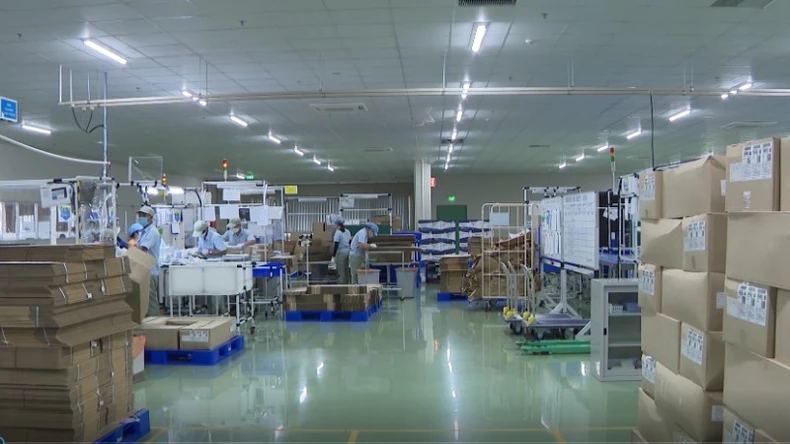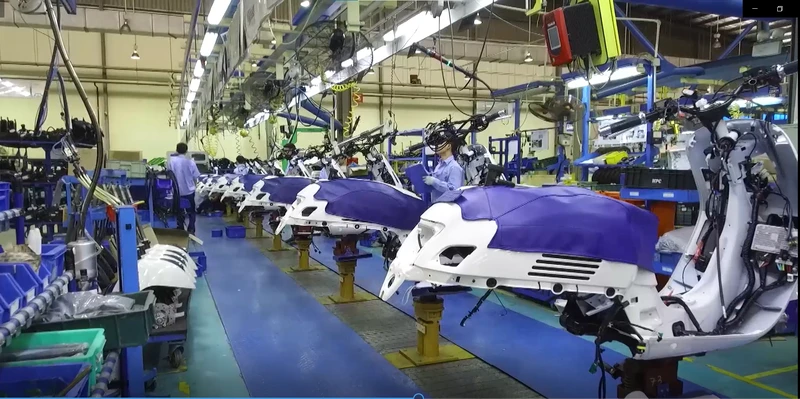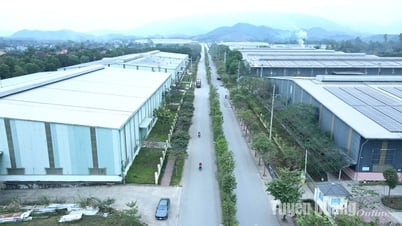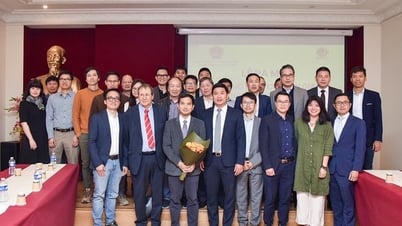Capital is the "heart" of a business.
Happy and sad stories about borrowing money
Small and medium enterprises are one of the five priority sectors and industries that are eligible for short-term loans in VND at preferential interest rates. However, in reality, very few small and medium enterprises have been able to access these preferential lending rates.
Mr. Nguyen Tien Loc, Director of Vinh Thinh Livestock and Dairy Processing Joint Stock Company, said that as one of the small and medium enterprises of Vinh Phuc province, for many years now, in order to have capital for production and business, the company has had to mortgage land use rights to commercial banks, with loan interest rates fluctuating at 9%/year - depending on the time, sometimes even up to 10 to 11%/year when the interest rate is floating.
Meanwhile, the loan period is very short, only about one year, making businesses unable to feel secure in the investment process because they have to both produce and worry about paying off bank loans.
"Some preferential policies for low-interest credit loans from the State are also known and highly appreciated by businesses, however, when "knocking on the door" of banks, businesses face strict conditions, making it impossible for businesses to borrow. We hope to create conditions for unsecured loans with preferential interest rates," added Director Nguyen Tien Loc.
Tan An Seafood Joint Stock Company, Quang Yen town, Quang Ninh province, for many years now, the company has proactively applied high technology to raise shrimp in 3 stages and increase the number of crops, thereby isolating shrimp from the disease environment and bringing high value every year. However, the company is also facing difficulties in accessing capital.
“Our assets have not been recognized by the State as assets attached to land. When doing business, especially aquaculture enterprises like us, we have to invest in high-tech infrastructure, with huge capital investment, up to tens of billions of VND. But all of that capital is the enterprise's own capital, mortgaged by real estate assets of individuals in the company to be able to borrow capital from the bank,” Director Ngo Hung Dung shared.

Many small and medium enterprises have difficulty accessing capital with preferential interest rates.
On the other hand, Mr. Nguyen Tuan Viet, Director of VIETGO Export Promotion Company, said that, besides the difficulties in accessing loans, there are also a number of other equally important factors that significantly affect the development of small and medium enterprises, such as business knowledge, the ability to quickly grasp the market, the application of high technology in production and the State's mechanism for enterprises.
In the current period, the state needs to encourage learning and developing commercial and business knowledge because this is also one of the weaknesses that hinders business development.
Chairman of the Association of Small and Medium Enterprises, Mr. Nguyen Van Than, said that, in general, in recent years, the team of entrepreneurs in particular and enterprises in general have grown in quality and quantity. However, the growth to meet the development needs is not high.
We do not lack preferential and supportive policies, they are quite complete, there are long-term policies, policies on actual conditions and requirements, the government fully meets them. There are even policies that are updated and changed at different times, but the problem here is how the departments, ministries, branches and related agencies implement them for businesses?
“It is clear that the support policies have been very timely, but somewhere the implementation of the policies has been quite low. Research is needed to resolve this bottleneck, and if it can be resolved, the development of enterprises will be very good,” Mr. Than emphasized.
Small and medium enterprises account for 98% of the total number of enterprises in Vietnam, and are very vulnerable to shocks from the market such as prices, product output, and input materials.
In particular, it can be clearly seen that during the Covid-19 pandemic, many businesses had to stop operating, even go bankrupt. At that time, the Government issued financial and tax relief packages to support businesses to restore production activities, but businesses could not absorb the policies for many different reasons related to procedures and conditions for benefit, leading to very low and ineffective disbursement of support packages.
Currently, small and medium enterprises mainly access credit capital through three main sources: Small and medium enterprise development fund; credit guarantee fund for small and medium enterprises; bank credit. However, there are localities that after establishing a fund for a while, it is dissolved because it cannot maintain its operations. Therefore, the number of funds tends to decrease, almost unable to promote its role and mission.
Ms. Nguyen Thi Thu Nguyet, National Assembly Delegation of Dak Lak Province, suggested: “The Government needs to re-evaluate the policies that we have supported in the past, such as the National Assembly Resolution and the Government's policies to support small and medium enterprises, so that enterprises have actually benefited from these policies. Are there any shortcomings or institutional barriers in the process of enterprises accessing capital from credit institutions and banks?"
Business credit - don't let policies be like "apricots"
The private economic sector currently has about 940 thousand enterprises and more than 5 million business households in operation, contributing about 50% of GDP, more than 30% of total state budget revenue and employing about 82% of the total labor force in economic growth and job creation.
However, the private economic sector still faces many barriers that hinder its development, and has not yet made a breakthrough in terms of scale and competitiveness. Most of them are micro, small and medium-sized enterprises with limited financial potential and management skills, and most of them have low technological and innovation capacity. Business thinking lacks strategic vision...
In order to remove barriers for small and medium enterprises, Resolution 68 on private economic development issued on May 4, 2025 by the Politburo sets out the following tasks: Review and perfect the credit policy mechanism for the private economy. Encourage financial and credit institutions to lend based on the assessment of production and business methods, market expansion plans, lending based on cash flow data, value chains, considering collateral including real estate, intangible assets, future assets and unsecured lending.
Perfecting the model of credit guarantee funds for small and medium enterprises at both central and local levels; Developing small and medium enterprises in the direction of expanding the subjects, simplifying, making transparent, and digitizing conditions, processes, and procedures for receiving, appraising, lending, and disbursing capital.

Support policies for businesses need to be correct and timely.
According to Mr. Pham Xuan Hoe, former Deputy Director of the State Bank Strategy Institute, Resolution 68 on private economic development is very comprehensive and complete, the tasks and solutions proposed in the Resolution are a great innovation in the mechanism for small and medium enterprises - "opening wide the credit door" which has been narrowed by the "cloth called mechanism" for so long.
However, in order for the Resolution to quickly come into effect, the Government needs to have very detailed and specific action programs, including more specific action programs. Assign tasks to each ministry and sector to determine which projects to work on, which decrees to issue, and which laws to advise the Government on to submit to the National Assembly. Consider these as KPI targets for the ministers leading ministries and sectors to complete their tasks, and set deadlines to ensure a better implementation roadmap.
Mr. Hoe also emphasized that whether or not it can be implemented depends on the policy advisors, this is a very important issue. Policy thinking needs to be radically renewed, or in other words, the thinking of policy making and advising ministries and branches must be renewed, because if we continue to follow the old way and then give many justifications to maintain the request-grant mechanism, it will be very difficult to do.
Professor, Dr. Dinh Van Hien, Chairman of the Board of Directors of DKNEC Group Joint Stock Company, said that in the current context, businesses themselves must innovate and improve, and cannot rely on support policies from the State. However, for businesses to thrive, the Government's support policies need to be timely and appropriate. Timing is very important.
Capital is the lifeblood of businesses. Difficulty in accessing capital is one of the barriers that makes small and medium enterprises fall behind on the path of integration and participation in the world free trade agreements that Vietnam has signed with other countries. Of course, it is also difficult to achieve the goal of developing 1.5 million businesses this year and 2 million businesses in the future.
Right now, it is the time for the Government and banks to provide the best support in terms of credit mechanisms, so that small and medium enterprises can make a breakthrough. However, the issued policies must be effectively implemented and put into practice, helping enterprises in the production and business process. Do not let the policies be like the custard apple - very fragrant and attractive but only for display and viewing.
Source: https://baotuyenquang.com.vn/cai-thien-nguon-von-cho-doanh-nghiep-vua-va-nho-212133.html





![[Photo] General Secretary To Lam receives First Deputy Secretary General of the African National Congress (ANC) of South Africa](https://vphoto.vietnam.vn/thumb/1200x675/vietnam/resource/IMAGE/2025/5/20/bb2999907e1245d5b4c7310a890d8201)
























![[Photo] Award ceremony for works on studying and following President Ho Chi Minh](https://vphoto.vietnam.vn/thumb/1200x675/vietnam/resource/IMAGE/2025/5/20/a08ce9374fa544c292cca22d4424e6c0)
![[Photo] Vietnamese shipbuilding with the aspiration to reach out to the ocean](https://vphoto.vietnam.vn/thumb/1200x675/vietnam/resource/IMAGE/2025/5/20/24ecf0ba837b4c2a8b73853b45e40aa7)






























































![[VIDEO] - Enhancing the value of Quang Nam OCOP products through trade connections](https://vphoto.vietnam.vn/thumb/402x226/vietnam/resource/IMAGE/2025/5/17/5be5b5fff1f14914986fad159097a677)
Comment (0)